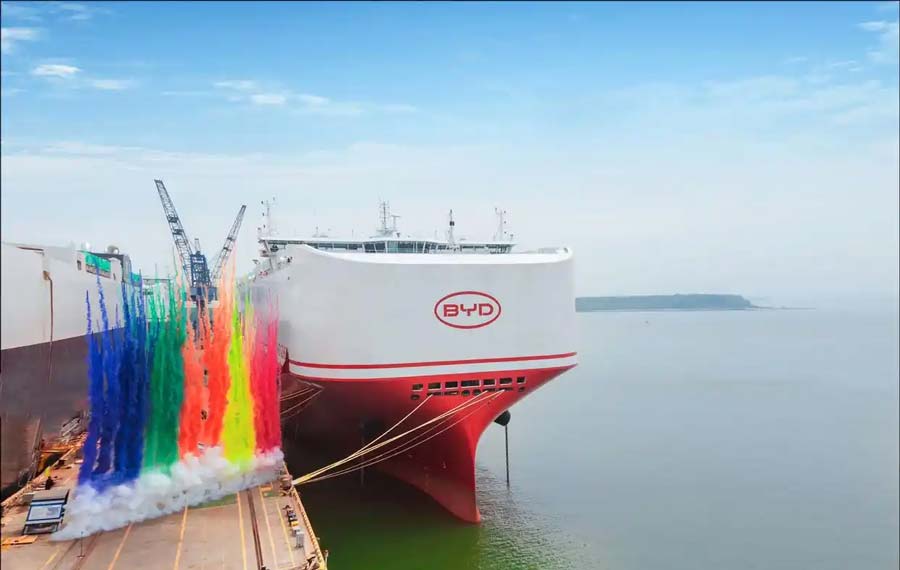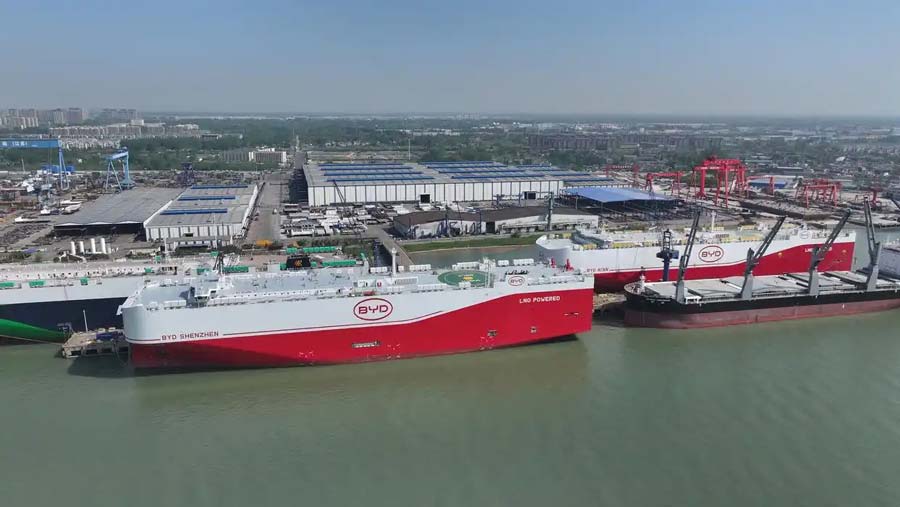

Byd's "Shenzhen" made its maiden voyage, the world's largest car carrier
On the evening of the 27th, BYD's "Shenzhen", the world's largest car carrier with the largest carrying capacity independently manufactured by China and already in operation, set sail for its first export voyage, carrying over 7,000 BYD new energy vehicles from Taicang Port in Jiangsu Province to Itayayi Port in Brazil. The entire voyage is expected to last for more than 30 days.
Byd is a well-known enterprise in China's new energy vehicle industry. The experts interviewed believe that the launch of the "Shenzhen Express" reflects that the era of "domestic vehicles operating independently" in China is accelerating its arrival.
The "Shenzhen" is a new energy vehicle carrier built by a shipyard under China Merchants Group and equipped with 9,200 standard loading Spaces. It is BYD's fourth professional new energy vehicle carrier. The first three professional new energy vehicle transport ships of BYD are all made in China.
According to statistics from the General Administration of Customs of China, China's auto exports exceeded 6.4 million units in 2024, ranking first in the world for the second consecutive year. Data also shows that currently, over 700 professional vessels engaged in ocean shipping of automobiles worldwide are mainly controlled by enterprises from Europe, Japan and South Korea, while the capacity of domestic automobile carriers accounts for only 2.63% of the global total. The transoceanic transportation capacity of automobiles in China still does not match the export capacity of automobiles.
In the first quarter of 2025, BYD's roll-on/roll-off ships transported over 25,000 new energy vehicles overseas. At present, BYD's new energy vehicles have left their footprints in over 100 countries and regions around the world.
Industry experts believe that the cost of sea transportation largely affects the terminal selling price. Building and operating their own fleets can give Chinese automakers more say and autonomy.
The competition among automakers to purchase ships and go global is a microcosm of the continuous growth and expansion of China's automotive industry and the accelerating pace of its internationalization. Xie Xiaowen, an expert committee member of the New Technology Promotion Branch of the China Transport and Logistics Association, said that car manufacturers purchasing ships to go overseas can ensure the stable operation of export business, reduce transportation costs, and guarantee the timely delivery of products to overseas users.
Byd is a well-known enterprise in China's new energy vehicle industry. The experts interviewed believe that the launch of the "Shenzhen Express" reflects that the era of "domestic vehicles operating independently" in China is accelerating its arrival.
The "Shenzhen" is a new energy vehicle carrier built by a shipyard under China Merchants Group and equipped with 9,200 standard loading Spaces. It is BYD's fourth professional new energy vehicle carrier. The first three professional new energy vehicle transport ships of BYD are all made in China.

According to statistics from the General Administration of Customs of China, China's auto exports exceeded 6.4 million units in 2024, ranking first in the world for the second consecutive year. Data also shows that currently, over 700 professional vessels engaged in ocean shipping of automobiles worldwide are mainly controlled by enterprises from Europe, Japan and South Korea, while the capacity of domestic automobile carriers accounts for only 2.63% of the global total. The transoceanic transportation capacity of automobiles in China still does not match the export capacity of automobiles.

In the first quarter of 2025, BYD's roll-on/roll-off ships transported over 25,000 new energy vehicles overseas. At present, BYD's new energy vehicles have left their footprints in over 100 countries and regions around the world.
Industry experts believe that the cost of sea transportation largely affects the terminal selling price. Building and operating their own fleets can give Chinese automakers more say and autonomy.
The competition among automakers to purchase ships and go global is a microcosm of the continuous growth and expansion of China's automotive industry and the accelerating pace of its internationalization. Xie Xiaowen, an expert committee member of the New Technology Promotion Branch of the China Transport and Logistics Association, said that car manufacturers purchasing ships to go overseas can ensure the stable operation of export business, reduce transportation costs, and guarantee the timely delivery of products to overseas users.





